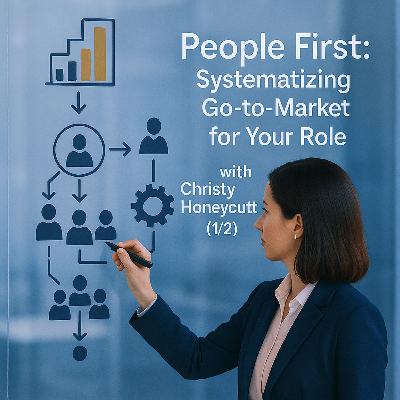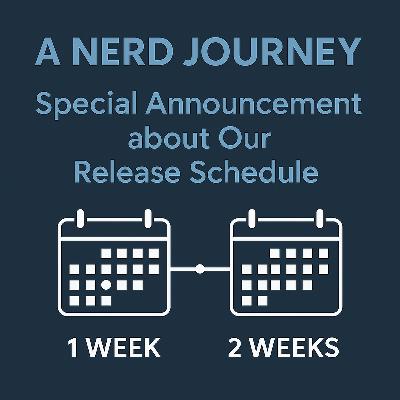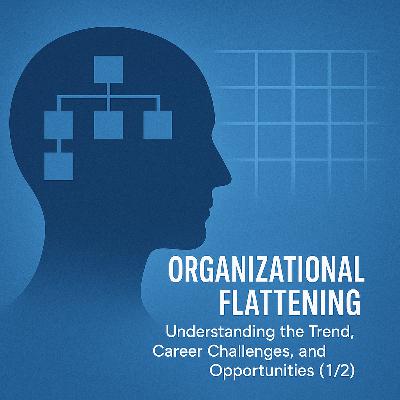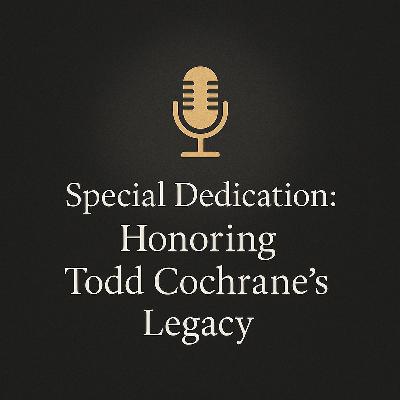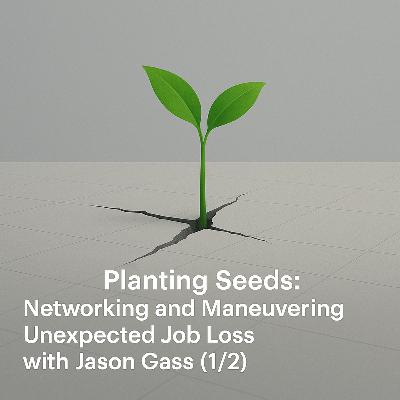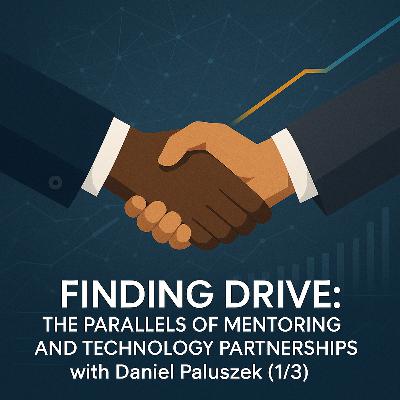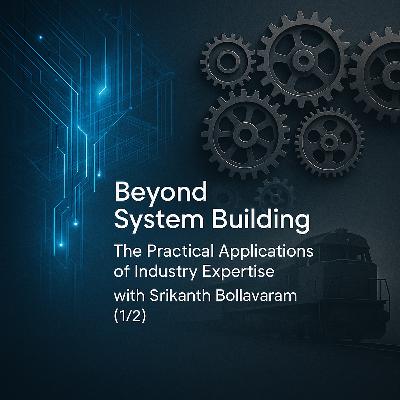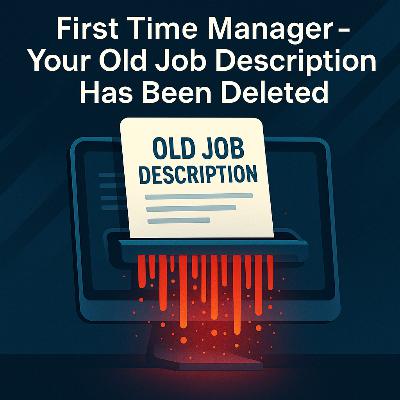Organizational Flattening: Intentionally Model Behaviors to Build the Culture You Want (2/2)
Description
As managers inherit larger teams inside flatter organizations, we might immediately point out the challenges. But what about opportunities? Despite the trend, those who seek to lead (in a management capacity or otherwise) have the chance to intentionally build a better culture.
We pulled in former guests Shailvi Wakhlu, Neil Thompson, and Abby Clobridge in a roundtable format to get actionable strategies.
In episode 348, we present actionable strategies for managers and individual contributors to thrive in this new environment. Listen closely to understand the importance of improving one’s communication skills, the unique opportunity and impact of the player coach / team lead, the critical elements of a manager’s role, and advice for job seekers in a tough market.
Original Recording Date: 09-27-2025
Topics – Framing Part 2 of Our Discussion, Opportunity for the Player Coach, Modeling the Benefits of Improved Communication Skills, Management Support of Strong Communicators, Individual Contributors and Communication, Succeeding as a Manager of a Large Team, The Culture of Large Teams, Advice for Job Seekers in a Tough Market, In Closing
1:01 – Framing Part 2 of Our Discussion
- Last week in Episode 347 – Organizational Flattening: Understanding the Trend, Career Challenges, and Opportunities (1/2), we introduced a slightly different format that we’re continuing this week based on an industry trend.
- The trend of organizational flattening in our industry has been top of mind for us. We’re seeing the continued layoffs in tech often times result in fewer management layers and an increase in the number of people reporting to a single manager.
- This topic is too big and has too many angles for a single conversation. We wanted to bring together multiple expert perspectives on this issue in a single episode. We’ve reached out to a handful of former guests and sent them specific questions on this topic. Those guests were kind enough to record their answers and send them back to us.
- Consider this a Nerd Journey roundtable or collection of hot takes from trusted voices. Our goal is to amplify their advice and provide a diverse set of strategies for navigating this landscape.
- In the first episode (last week), we explored the trend of flatter organizations and the consequences for your career path and team culture. This week in part 2 we will focus on actionable insights for thriving in this environment.
- Here’s the full set of episode links we will share throughout the conversation if you would like to hear more from one of the former guests who participated:
- Shailvi Wakhlu
- Episode 210 – A Collection of Ambiguous Experiments with Shailvi Wakhlu (1/2)
- Episode 211 – Structure the Levels of Contribution with Shailvi Wakhlu (2/2)
- Self-Advocacy: Your Guide to Getting What You Deserve at Work by Shailvi Wakhlu
- A special 15% off link for Nerd Journey listeners to Shailvi’s self-advocacy course can be found here.
- Neil Thompson
- Episode 193 – Communication for Specialists with Neil Thompson (1/2)
- Episode 194 – Question Askers and Problem Solvers with Neil Thompson (2/2)
- Teach the Geek YouTube Channel
- Abby Clobridge
- Episode 292 – Library Science: Information Architecture and the Synthesis of Details with Abby Clobridge (1/2)
- Episode 293 – Enterprise Knowledge Management: A Consultative Approach to Solving the Right Problems with Abby Clobridge (2/2)
- Shailvi Wakhlu
1:42 – Opportunity for the Player Coach
- We’ll start by discussing the opportunity of being a player coach (another way we often reference the team lead or tech lead role).
- Shailvi Wakhlu is a leadership speaker and data consultant with experience building and leading large organizations, including structuring of job levels for career paths. We spoke to her in episodes 210 and 211 She’s also the author of Self-Advocacy: Your Guide to Getting What You Deserve at Work.
Our question for Shailvi:
- As organizations flatten and there are less manager roles, does this create an opportunity for people to become a technical lead or team lead to help the manager scale? We would love to hear any perspective you have on how the team lead / tech lead (i.e. player coach type role) changes as a result of the org changes.
- Even without the trend of flattening or decreasing the number of managers, there has consistently been an opportunity for people to demonstrate the mindset of group leadership. Someone could be a project lead, a team lead, or a technical lead.
- The technical lead focuses more on technical standards to which a team needs to adhere.
- “I think anything that you do that helps your manager manage the team, scale the team, grow the output, or just have better focus…has always been a good way to get your foot in the door for those type of roles in the future.” – Shailvi Wakhlu
- Shailvi remembers working at companies where several people wanted to someday get into a management role. Even in times of heavy hiring, there is no way to accommodate everyone who wants to eventually do this.
- People stepping into those lead roles would have a leg up on other candidates for future management roles.
- “If I see somebody is doing a fantastic job of managing a project, I know that there is a subset of manager responsibilities that they’re able to handle. If I see them doing team events…if I see them stepping up on technical leadership, defining standards…all of these things kind of point to that same larger skillset. And I always encourage that even if there is no formal capacity in which you can do this, even if you create your own opportunity and showcase that…this is a space where I see our team could improve…even without the manager title I think you have plenty of options to contribute at that stage…and definitely in this type of a market where there are less manager roles.” – Shailvi Wakhlu
- Shailvi believes the job market will bounce back, and when it does, there will not be enough people who have been managers and have done things like performance management, skill assessment, and hiring. People who can showcase they have some of this experience and the right mindset have a good start toward landing a management role.
- Before Shailvi was a manager, she was the hiring lead on her team of 2 people. Shailvi defined the standards (measurements, rubrics, etc.) for the interview process. She tells us doing this made it far easier to transition into a full-time manager role.
5:25 – Modeling the Benefits of Improved Communication Skills
- We wanted a perspective on communication in this current climate and reached out to a former guest with expertise in this area.
- Neil Thompson is the founder of Teach the Geek, an organization that helps technical professionals in STEM (science, technology, engineering, and mathematics) improve their public speaking and presentation skills. He’s also the host of the Teach the Geek Podcast. We originally spoke to Neil in episodes 193 and 194.
Here’s what we asked Neil:
- How do you think team leads or technical leads (sort of that player coach role) play into the development of strong communicators? Where do they help people where managers cannot?
- Players (or individual contributors on a team) don’t see themselves as managers and would not be modeling themselves after managers. A player coach is way closer to each member of the team’s current role than a manager.
- Player coaches who are adept at communicating well can model these skills for other


